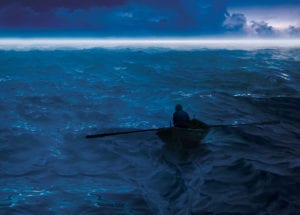If this lecture doesn’t scare you straight, nothing will. Dr. Jeremy Jackson discusses human-created ocean impacts: habitat destruction, overfishing, introduced species, warming, acidification, toxins, and massive runoff of nutrients. We’re facing major extinctions. Just for starters, he says that, because of ocean acidification, “some day we’ll have no seashells on the beach.”
Definitely a downer. But sometimes you need that to get out of your chair, no? Jackson does describe how these trends might be halted and reversed. “it’s staggering what we have to do to fix this,” he says. “We have to change how we live. We have to become citizens again. . . . Why haven’t you demanded bullet trains between LA and San Francisco?” Then he became heated:
“Just don’t go to the mall. . . . . If you want to really win the war, don’t go shopping. . . . We can’t unscrew the light bulb. We have to fix everything, at the same time, now. . . . When people ask me, what’s the biggest problem, overfishing, climate change, dead zones, I say: Yes. . . . The oceans are in crisis. . . . . Are you willing to walk out of this room and actually change something? . . . . We [Americans] have zero credibility because of our consumption patterns. . . . What would probably do more good than anything is if every young person in this country [the US] had to go live somewhere else for six months.”
Jackson was asked what academic scientists can do.His response:
“I have long felt that we scientists are at least 50 percent to blame for the last eight years because we collectively didn’t have the courage of our convictions to speak out about basic science. . . . Scientists could make science fun and interesting. . . restore it to its rightful place, not just in government but in society. . . As professors, we have a bully pulpit. We have the opportunity to do this. And I think it’s a little embarrassing how few people do do it. The students are doing it. That’s the other thing that gives me hope. The students are doing it, big time.”
Towards the end of the talk, he mentioned, smiling, that he and his wife are often referred to as “Dr. Doom and Gloom.”
In answer to a question about Bush’s “blue” legacy, the Pacific Ocean Monument he created just before leaving office, Jackson said: “It’s spectacular. There’s nothing bad about it. He [Bush] can now say he’s protected more land than any other person.” He also said, “It was easy. Nobody powerful lives there.”
Jeremy Jackson is an eminent marine ecologist based at Scripps Institute of Oceanography. This lecture was given at UCLA Feb. 17, 2009.

